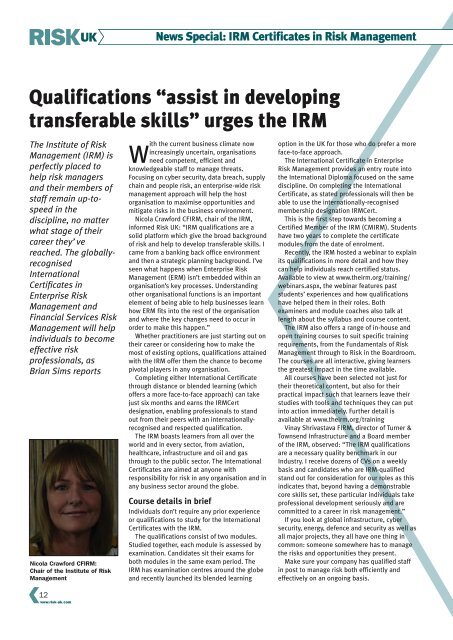RiskUKNovember2017
You also want an ePaper? Increase the reach of your titles
YUMPU automatically turns print PDFs into web optimized ePapers that Google loves.
News Special: IRM Certificates in Risk Management<br />
Qualifications “assist in developing<br />
transferable skills” urges the IRM<br />
The Institute of Risk<br />
Management (IRM) is<br />
perfectly placed to<br />
help risk managers<br />
and their members of<br />
staff remain up-tospeed<br />
in the<br />
discipline, no matter<br />
what stage of their<br />
career they’ve<br />
reached. The globallyrecognised<br />
International<br />
Certificates in<br />
Enterprise Risk<br />
Management and<br />
Financial Services Risk<br />
Management will help<br />
individuals to become<br />
effective risk<br />
professionals, as<br />
Brian Sims reports<br />
Nicola Crawford CFIRM:<br />
Chair of the Institute of Risk<br />
Management<br />
12<br />
www.risk-uk.com<br />
With the current business climate now<br />
increasingly uncertain, organisations<br />
need competent, efficient and<br />
knowledgeable staff to manage threats.<br />
Focusing on cyber security, data breach, supply<br />
chain and people risk, an enterprise-wide risk<br />
management approach will help the host<br />
organisation to maximise opportunities and<br />
mitigate risks in the business environment.<br />
Nicola Crawford CFIRM, chair of the IRM,<br />
informed Risk UK: “IRM qualifications are a<br />
solid platform which give the broad background<br />
of risk and help to develop transferable skills. I<br />
came from a banking back office environment<br />
and then a strategic planning background. I’ve<br />
seen what happens when Enterprise Risk<br />
Management (ERM) isn’t embedded within an<br />
organisation’s key processes. Understanding<br />
other organisational functions is an important<br />
element of being able to help businesses learn<br />
how ERM fits into the rest of the organisation<br />
and where the key changes need to occur in<br />
order to make this happen.”<br />
Whether practitioners are just starting out on<br />
their career or considering how to make the<br />
most of existing options, qualifications attained<br />
with the IRM offer them the chance to become<br />
pivotal players in any organisation.<br />
Completing either International Certificate<br />
through distance or blended learning (which<br />
offers a more face-to-face approach) can take<br />
just six months and earns the IRMCert<br />
designation, enabling professionals to stand<br />
out from their peers with an internationallyrecognised<br />
and respected qualification.<br />
The IRM boasts learners from all over the<br />
world and in every sector, from aviation,<br />
healthcare, infrastructure and oil and gas<br />
through to the public sector. The International<br />
Certificates are aimed at anyone with<br />
responsibility for risk in any organisation and in<br />
any business sector around the globe.<br />
Course details in brief<br />
Individuals don’t require any prior experience<br />
or qualifications to study for the International<br />
Certificates with the IRM.<br />
The qualifications consist of two modules.<br />
Studied together, each module is assessed by<br />
examination. Candidates sit their exams for<br />
both modules in the same exam period. The<br />
IRM has examination centres around the globe<br />
and recently launched its blended learning<br />
option in the UK for those who do prefer a more<br />
face-to-face approach.<br />
The International Certificate in Enterprise<br />
Risk Management provides an entry route into<br />
the International Diploma focused on the same<br />
discipline. On completing the International<br />
Certificate, as stated professionals will then be<br />
able to use the internationally-recognised<br />
membership designation IRMCert.<br />
This is the first step towards becoming a<br />
Certified Member of the IRM (CMIRM). Students<br />
have two years to complete the certificate<br />
modules from the date of enrolment.<br />
Recently, the IRM hosted a webinar to explain<br />
its qualifications in more detail and how they<br />
can help individuals reach certified status.<br />
Available to view at www.theirm.org/training/<br />
webinars.aspx, the webinar features past<br />
students’ experiences and how qualifications<br />
have helped them in their roles. Both<br />
examiners and module coaches also talk at<br />
length about the syllabus and course content.<br />
The IRM also offers a range of in-house and<br />
open training courses to suit specific training<br />
requirements, from the Fundamentals of Risk<br />
Management through to Risk in the Boardroom.<br />
The courses are all interactive, giving learners<br />
the greatest impact in the time available.<br />
All courses have been selected not just for<br />
their theoretical content, but also for their<br />
practical impact such that learners leave their<br />
studies with tools and techniques they can put<br />
into action immediately. Further detail is<br />
available at www.theirm.org/training<br />
Vinay Shrivastava FIRM, director of Turner &<br />
Townsend Infrastructure and a Board member<br />
of the IRM, observed: “The IRM qualifications<br />
are a necessary quality benchmark in our<br />
Industry. I receive dozens of CVs on a weekly<br />
basis and candidates who are IRM-qualified<br />
stand out for consideration for our roles as this<br />
indicates that, beyond having a demonstrable<br />
core skills set, these particular individuals take<br />
professional development seriously and are<br />
committed to a career in risk management.”<br />
If you look at global infrastructure, cyber<br />
security, energy, defence and security as well as<br />
all major projects, they all have one thing in<br />
common: someone somewhere has to manage<br />
the risks and opportunities they present.<br />
Make sure your company has qualified staff<br />
in post to manage risk both efficiently and<br />
effectively on an ongoing basis.

















